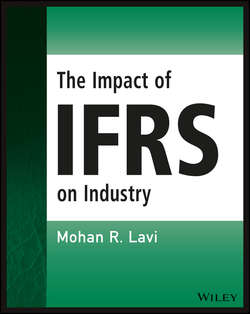Читать книгу The Impact of IFRS on Industry - Lavi Mohan R. - Страница 3
На сайте Литреса книга снята с продажи.
Preface
ОглавлениеDuring the course of my lectures across India and abroad on International Financial Reporting Standards (IFRS) and other accounting related topics, I was always fascinated by the questions that the participants put forward. Each session was different and so was each question. There were, of course, questions that were not in any way related to accounting or standards but that is to be expected anywhere. Probably what fascinated me more was that accountants were able to pose questions on how, for instance, a refractor should be accounted considering its use, or whether an internally generated brand qualifies for recognition as an intangible asset when the brand has been hypothecated to a bank and funds obtained. Most of my employment was with companies that were based in the United States and hence I had exposure to the industry-specific provisions of US GAAP. As IFRS grew in importance, my mind was filled with thoughts as to how different industries would be impacted if they transitioned to IFRS. Those thoughts are set out in this book.
Having worked in different industries, I have extrapolated an IFRS-implementation scenario in these industries to ascertain the impact. For other industries, I have researched the annual reports of large companies operating in these industries and asked questions of friends and associates working in these industries. As always, the internet threw up way too much information – I have digested this information and present only the relevant parts of which I am absolutely sure, and which are supported by other tangible evidence.
This book is primarily intended for entities that are yet to transition to IFRS and are considering an impact assessment. Entities that have already moved over to IFRS could find the book useful in the impact of revised IFRS Standards that are to come out in the future or the impact that annual impairment tests or fair valuation would have. Others who are interested in IFRS as academics or students could find the book useful for their areas of work.
The book is divided into six chapters. Chapter 1 discusses the origin of accounting standards and how they appear to be moving to an industry-based era. Chapter 2 summarizes all the disclosure requirements of IFRS. Chapter 3 details the impact that IFRS Standards would have on all industries while Chapter 4 discusses this impact for specific industries. Chapter 5 discusses the collateral impact of IFRS while Chapter 6 concludes with a discussion on how future IFRS Standards could impact specific industries. The book concludes with an appendix that contains a tabular summary of the impact discussed.
Readers are encouraged to read the book in any order they prefer.
I do hope readers enjoy this book.
Bangalore
January 31, 2016
